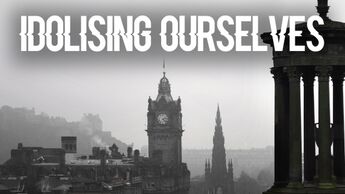
Society is immersed in looking inward. It’s an addiction, an obsession that has become all-consuming. It’s the project of remaking ourselves.
What am I talking about? In secular Scotland today the country ticks along in general terms without any reference to the sacred canopy which shines all around us. This divine membrane has been long forgot and the vast majority live lives of complete ignorance to its vibrant reality. There are others who in protest to all forms of faith and shake their heads that such an enhancement to life exists. What can be measured and reasonably explained, they claim, is the full extent of what is real.
Add to this the growing trend of emotionalism. This too is a child of the Scottish Enlightenment: our feeling affections being the compass of what is ‘right’. We see this in an increasing sense in our media as journalists report stories that will evoke outrage and offence. Our MSPs and MPs are now on a regular basis making a case for something in parliamentary time based on an emotional rejoinder to current affairs. David Hume is alive and well in Scotland today!
Living lives that ignore or ignorant of Father, Son and Holy Spirit leads to the inevitable fixation upon ourselves. We as humans must create our own reality, we tell ourselves. We must create meaning for society. We must determine who we are. We must define what it is to be human. We must dissipate all perceived boundaries to existence. In short, we turn to ourselves. We elevate ourselves. In the end, we arrive at the idolatry of ourselves and one another.
It is no surprise that this has not been the first impulse in this direction. Blaise Pascal, when reflecting upon his contemporaries as they lived life apart from God described: “[they] float in a medium of vast extent, always drifting uncertainly, blown to and fro… Nothing stands still for us… We burn with desire to find a firm footing, an ultimate, lasting base on which to build a tower rising up to into eternity, but our whole foundation cracks and the earth opens up into the depths of the abyss.”
Reminiscent of the story of the tower of Babel the world of Pascal, as it is in Scotland today, seeks to ‘build ourselves …, [to] make a name for ourselves’ (Gen. 11.4). The purpose is not to reach for God; that might indeed be admirable. Instead our building, our deconstruction and subsequent remaking of ourselves is deliberately for our own perceived benefit. We put ourselves forward. We tell ourselves a new story that we are the goal of all things.
Pascal however has anticipated long ago where we are headed with this insatiable impulse – the abyss. There is no story of us without reference to the sacred canopy. There is no meaning to human life without talking of a peasant Galilean from the first century AD. It is only a story of his political execution and his resurrection from death a few days later that brings reality alive to the sacred canopy. Without close attention and devotion to him in this story on the outskirts of Jerusalem can Scots live their best life today.
He is the one who has shown us what it really means to be human. For women and men alike, any existence is at a loss for enhancement, vitality and purpose without an exclusive friendship with him (John 15.14). Jesus is what makes human really human. Jesus is the antidote to worshipping ourselves. Jesus is the only one to safe us from the abyss.

By Dr Stuart Weir, National Director of CARE for Scotland

Share story
Idolising Ourselves – A Good Society